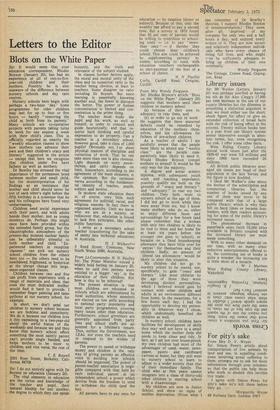Sir: I do not entirely agree with Dr Boyson on
education (January 20). • The vital elements in education are the virtue and knowledge of the teacher and pupil, their natural kinship for one another, the degree to which they can speak honestly, and the truth and relevance of the subject studied.
In classes further factors apply, the moral and mental unity of the class and its numerical ratio to the teacher being obvious, at least to teachers. Some disagree on ratio including Dr Boyson. But since learning is essentially knowing another soul, the fewer in dialogue the better. The power of human concentration is limited and concentration is the prime thing.
The teacher must study the pupil and his work, as well as himself, in order to connect and guide heuristically; and that requires hard thinking and careful expression to do properly.. Can a teacher in a secondary school, however good, take a class of 1,000 pupils? Obviously not, f or sheer physical reasons of discipline and correction of work. That he can take more than one is also obvious. Light depends on unity nevertheless, and unity depends on limit. Somewhere, according to the agreement of the main elements, is the optimum. But the optimum varies according to the fundamental identity of teacher, pupils, subject and motive.
In modern state education there is, of course, very little such agreement for political, racial, and religious reasons. In fact there is organised anarchy. Until we know who we are as a society, or rediscover that, education is bound to lack first principles, like other public functions.
I write as a secondary school teacher (transferring for the sake of sanity into technical education) in Australia.
H. J. Witheridoo 3 Reed Street, Cremorne, New South Wales 2090, Australia.


































 Previous page
Previous page